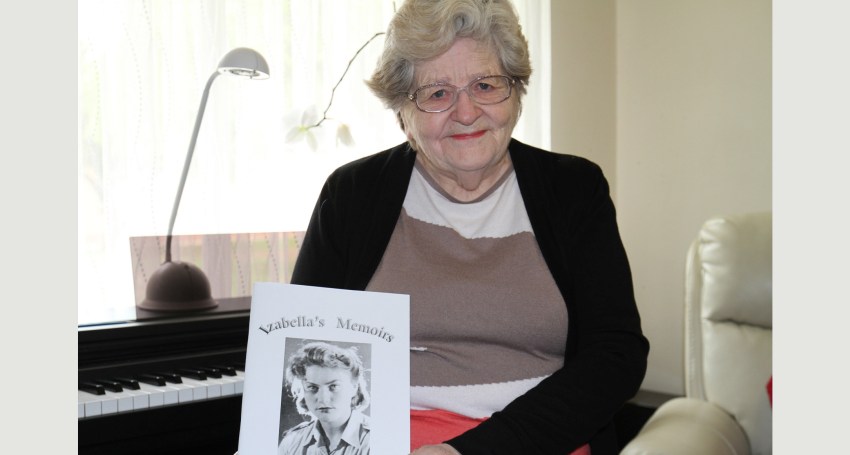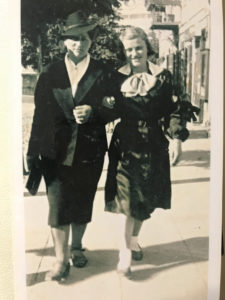War memoirs brought to life
People
When Izabella Picheta died eight years ago just before her 89th birthday, her children came across a series of articles she’d written for a local Polish newspaper. Recently translated by her daughter, the memoirs provide a fascinating insight into her conscription to possibly the strangest army of WWII.

“My heart feels like a block of ice. Death is looking me straight in the eye. Only I have to calm down. With passion, I try to stop my hands shaking and my knees from feeling so weak. My eyes fill with tears. I farewell my youth, I farewell my young life.”
So writes Izabella of her fear that German soldiers would attack the 316th Transport Company, a group of Polish servicewomen driving trucks loaded with ammunition, food and petrol to and from the Italian front in 1944.
It’s just one of a number of ‘near misses’ she experienced after her life as a carefree 14-year-old living in eastern Poland changed dramatically with the German invasion of Poland and the Second World War.

Iza (right) with her mother, Maria, in Poland just before the war.
Born into a relatively affluent family with links to the aristocracy, Izabella Kotlowska (Iza) was a spirited, clever girl who gave her teachers grief. But she was forced to grow up quickly after her town was bombed by the Germans and then taken over by Russians when the country was partitioned in September 1939.
The Kotlowska family had to share their home with strangers, school teachers were replaced by members of the Communist Party, many Poles were imprisoned (including Iza’s brother) and the first of a wave of deportations to Siberia began.
Advertisement
Just as her mother had opened up her home to refugees when the Polish army retreated, Iza gave her sandwiches each day to prisoners at the railway station waiting to be deported, despite being hit with rifle butts by Russian soldiers. One day, a woman called from a train wagon, crying because her child had frozen to death. “Please bury her. I beseech you.” Iza carried the child on her bike to the church cemetery.
A few months later, Iza and her parents were amongst the 1.1 million Poles “voluntarily” deported to Siberia between February 1940 and June 1941. They spent three weeks in overcrowded cattle trucks before being assigned to a kolhoz (a private collective farm).
“The weather was cold – minus 40 degrees. Our eyes were covered in frost. My face was wrapped in a large scarf – I had to make sure my nose did not stick out, because if it did it would freeze off,” Iza writes of her work carting logs.
Another long journey in cattle trucks followed, to Akhmolinsk to build a railway to Kartaly.
After the Germans declared war on Russia the gates of the prisons and labour camps in Soviet Russia were opened, and so “on the steppes of Siberia, began the history of the strangest army of World War II, that of the Second Corps,” writes Iza.
Advertisement
Those who were well enough, and had enough strength, made the arduous journey of thousands of kilometres to Iran.
The Soviet Union later withdrew support for the creation of a Polish army on its territory, placing people like Iza in a precarious position. She was forced to return to Siberia to rescue her parents and at the same time helped more than a dozen others to flee Russia.
On the boat to Iran, Iza suffered from recurring malaria and was hospitalised on her arrival in Iran, but she soon joined other members of the Polish army in Palestine.
Her parents travelled with orphans through to Teheran to Isfahan. A book titled Isfahan, the City of Polish Children describes Maria Kotlowska, Iza’s mother, as the director of the centre and her husband as tutor. The couple volunteered for service in Africa, leaving with the orphaned children in March 1943.
Meanwhile, Iza was being taught how to drive in Palestine and became the first in her course to sit behind the wheel of a truck. She and the other young women were also encouraged to complete their secondary schooling.
“During the week books were our constant companions…but Saturdays and Sundays the weekends were ours. We toured Palestine. We visited Jerusalem…we attended the Stations of the Cross together, and then we went on to Bethlehem.”
The Second Corps then travelled through the desert to Egypt. On the look-out for a “handsome soldier” in Cairo to help her friend bargain with the Arabs for a watch, she came across an officer having his boots shined. One thing led to another and they had dinner together and the next day went shopping for shoes. Little did Iza know that she would wear the same shoes when she married the officer a year or so later.
After transporting troops from the Second Army corps to Port Said, where they boarded the ship to Italy, it was finally time for Iza and the 316th Transport Division to take the short journey across the Mediterranean. Here they had their first frightening taste of the front line, albeit from a distance.
Unfortunately Iza’s story ends abruptly here. Her articles were originally published in the Polish monthly, Slowo Polskie, between 2002 and 2004, and were also retold by Iza on a local Polish radio station.
While her family has not been able to find any more memoirs, they know some of what happened next.
On May 16 1944, soldiers from the Polish II Corps launched an assault on Monte Cassino, one of the major battles of World War II. After the German defenders were finally driven from their positions – at the expense of 55,000 Allied casualties – a Polish flag followed by the British Union Jack were raised over the ruins of the hilltop abbey.
In October of that year Iza was reunited with Jurek Picheta, the Polish officer she had met in Cairo. Still in the army, they were married in Loreto, and their first child, Jola, was born in Trani on the east coast of Italy at a Polish base hospital, just days after the armistice in 1945.
The couple gained permanent residency in the UK due to their service under British command and had two more children, Marek and Basia. In 1967 the family came to Adelaide as ‘Ten Pound Poms’. Iza became very involved in the local Polish Catholic community and received the OAM in 1998.
In her introduction to the memoirs, Jola Kozak says her mother’s life was “shaped and defined by love, war, loss…and the irrepressible urge to help anyone or anything in need”.
Jola has followed in her mother’s footsteps as an active member of the St Maximilian Kolbe Ottoway parish, where she plays the organ and is currently volunteering as parish secretary.
After she started the translation in 2018, her husband died in August last year, and she found herself with more time to complete the project.
When the family gathered at Christmas, Jola, Marek, who edited the translated memoirs, and Basia surprised their children and grandchildren by getting them all to unwrap their booklets at the same time.
“They were speechless,” Jola said.












Comments
Show comments Hide comments